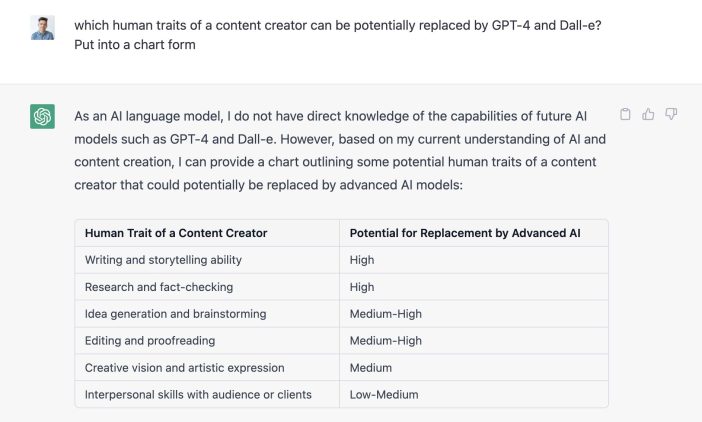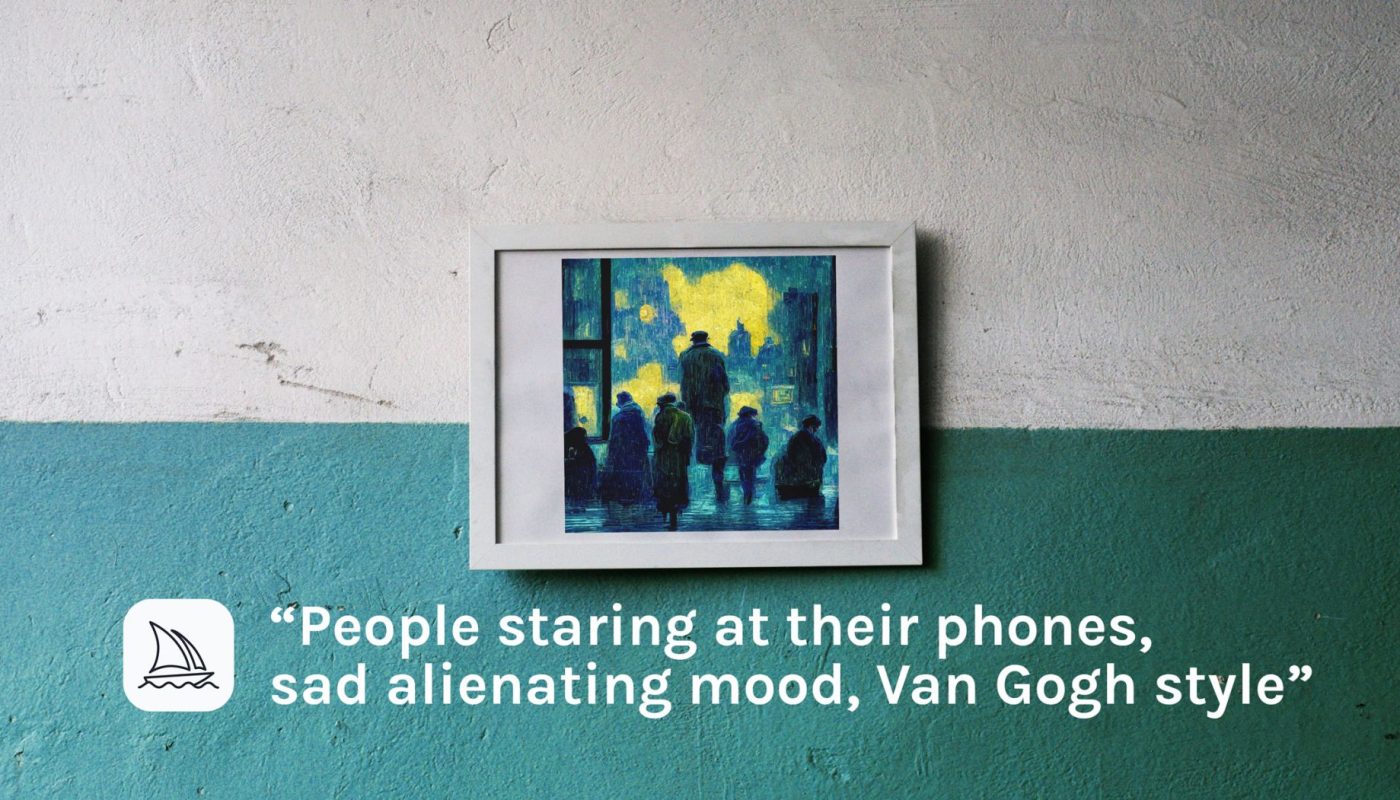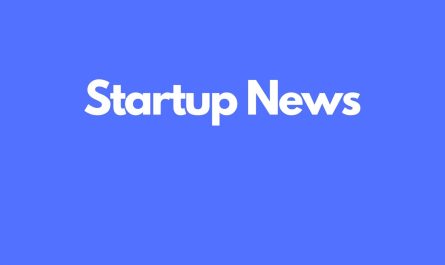Content
- Are the recent developments in ai bad for humanity?
- How are creatives affected by this?
- Will humans be able to adapt?
Are the recent developments in ai bad for humanity?
A recent report from Goldman Sachs economists predicted that 18% of global jobs could be replaced by computers and around 300 million full-time jobs could be affected by ai.
But are we sure about it? Why is ai bad for society? Is this really an issue if we compare the other big challenges that ai poses to us?
The Economist reminds us of a famous study published by Oxford University ten years ago which stated that 47% of all tasks carried out by Americans were at risk of being replaced by automation. Although there is still some time to see if this prediction will hold true, the current labour market shows a different reality, with two job vacancies for every unemployed American, and labour shortages in several sectors. Historically, fears about technological innovation killing jobs were generally mitigated by the new jobs that those same tech innovations were creating.
“We call on all AI labs to immediately pause for at least 6 months the training of AI systems more powerful than GPT-4” says the letter which has been signed by Elon Musk, CEO of SpaceX, Tesla and Twitter, Yuval Noah Harari, author and professor, Steve Wozniak , co-founder of Apple and other eminent entrepreneurs, intellectuals, and researchers. The disruptive ai developments that we see emerging every day are posing many questions about possible catastrophic side effects. The truth is that “no one – not even their creators – can understand, predict, or reliably control these powerful digital minds” and therefore independent regulators are called to oversee these new ai systems. The full letter is available here.
https://twitter.com/itisprashanth/status/1636282688180215809?s=20
How are creatives affected by this? And which jobs?
A little spoiler which will probably surprise nobody: there is quite some agreement on seeing ai innovations such as ChatGPT and Midjourney as enhancements rather than replacements for human capabilities. Answering the question is probably more difficult than it seems. Let’s have a look at some examples to figure out what that means for real:
Photography
The professional position of a photographer has been able to survive the disruption of smartphones. Both companies and individuals have been keeping hiring photographers to capture better photos for their needs. Do ai-generated image tools such as Midjourney or Adobe Firefly really represent the end for any photographer? It will certainly represent the end of this profession the way we were used to seeing it.
Much technical knowledge such as exposure, aperture, ISO, and white balance will be required to improve the outcome of prompts. Knowledge about visual psychology, including how people perceive elements and why certain compositions work better than others, will also be important to recognise good creations from bad ones.
Proficient users in software like Adobe Firefly or Midjourney will potentially be able to outperform classic photographers. Nevertheless, the knowledge and experience that a professional photographer possesses will be still in high demand. Without expertise in the photography domain, it would be challenging to obtain satisfying outcomes. Apps like Adobe Firefly, which will soon release its beta version, will undoubtedly enhance the workflow of photographers.
https://www.youtube.com/watch?v=_sJfNfMAQHw
The potential for companies is immense. Imagine for example all the budget needed for a shooting. A lot of tasks such as project management, searching for models, selecting equipment, shooting, and editing can be removed or streamlined.
Graphic Design
It must be frustrating for a designer who has invested plenty of time in learning software such as Adobe Illustrator to acknowledge that the next generation of a graphic designer can easily get by without that same knowledge.
As technology continues to advance, many industries are undergoing a transformation. The design industry is no exception, and the advent of advanced AI models such as Midjourney is poised to revolutionize the way designers work.
Design principles such as contrast and white space are essential to creating effective designs, and these principles can easily be assimilated by an advanced AI such as Midjourney. The ability to analyze and understand these principles can help AI models create designs that are both aesthetically pleasing and effective in communicating a message.
In fact, many tasks that were once the domain of human designers may be reduced to a properly written prompt for an AI model. Tasks such as coming up with a visual concept and making a final layout for print can be delegated to an AI model, freeing up human designers to focus on more complex tasks that require creativity and strategic thinking. This kind of support is even more evident in the workflow of UX designers.
However, it’s important to note that the outcomes generated by AI tools will still need to be sorted out and refined by humans. A trained eye with knowledge about communication strategy, business requirements, and the target audience will still be important in ensuring that designs effectively communicate the intended message.
Overall, the job of a designer will be transformed by the rise of advanced AI models. While some tasks may be delegated to AI, the role of human designers will continue to be crucial in guiding and refining the outputs generated by these models. The design industry is in the midst of an exciting transformation, and designers who are able to adapt and embrace new technologies will be well-positioned to thrive in this changing landscape.
Content Creator

The new emerging ai tools will revolutionize the workflow of content creators. Indeed, creating video and static assets for social media has never been so easy thanks to the very large offer of magic wands powered by ai. In fact, there are countless apps to generate the following assets with just a prompt or a script:
- Impressive images
- Eye-catching titles
- Human-alike voice-overs
- Videos (but still rough in quality)
- Text content for captions and long articles
Content creators have to come up with engaging content at a fast pace and GPT 4 can help them brainstorm and generate ideas. The time spent in production can be massively reduced with the support of tools such as Adobe Firefly.
Nevertheless, some tasks which require empathising with the audience, exchanging with colleagues, and interacting with the community will probably still be managed mainly by humans with limited usage of ai tools to avoid biases and wrong communications.
Will humans be able to adapt?
As for now, we can safely state that ai will not completely replace humans in the creative field, but it will definitely bring massive transformations. A photographer might need to master prompt engineering skills to improve the images and a content creator to make titles more attractive.
The broader question arises: is ai bad or good for humans in general?
Read more
Advanced Guide to Midjourney in 5 Minutes
Level up Your Ai Images







I agree, it will take time to really replace humans
Hey Salvatore, thank you for your feedback!
I liked that you asked ChatGpt to make the charts, great article by the way!
I am glad that you liked it! Thank you Giovanni
it’s probably too early to say whether ai is good or bad, but this article help understanding better the consequences on the job market of this new phenomenon. thank you luca for the research!
Thank you for the interesting article!
You’re welcome Alessandra! Thank you for your feedback
A really relevant topic! As a content creator, I see a lot of opportunities in AI, probably more than threats. I still think that we humans like to interact with other humans. So I don’t believe that our jobs will just vanish in the next few years, but tools like ChatGPT can certainly enhance our abilities by providing efficient solutions and even inspiring new ideas. As such, I think that embracing AI can greatly benefit content creators and even help us stay relevant in an ever-changing digital landscape.
Hi Lea, thank you for your super valuable input! I totally agree with you. By testing some of the tools available I figured out that the human touch was always needed to make the content or design more relevant and meaningful. From what you said, you might have experienced the same. And I am also optimistic regarding content creators as well as other creative jobs. Nevertheless keeping up with the new advances in ai will be important!